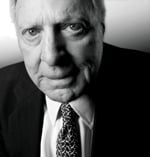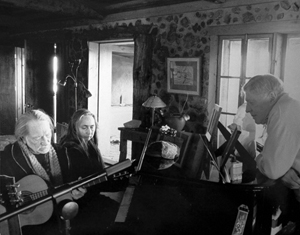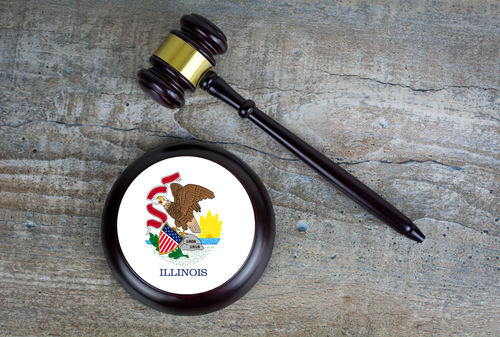Joe Jamail

Joe Jamail
Photo by Scott Pasfield
Joe Jamail settled into his chair at home to map out his closing argument for the next morning. The case was a highly complicated business dispute between two of the largest corporations in the world—a multibillion-dollar merger gone awry. Just as Jamail picked up his pen, he heard a car horn blowing outside.
Jamail’s buddies—singer Willie Nelson and former University of Texas football coach Darrell Royal—were in a white limo, begging him to go out for a drink or two.
“I tried telling them that this was the biggest damn case of my life—hell, of anybody’s life—and that I needed to prepare,” says Jamail. “But they weren’t having any part of it. They kept me up all fucking night drinking. I could barely see straight the next morning.”
Jamail did just fine. He kept his closing argument simple. The case was about people keeping their word and being honest—or, in the case of the defendants, about not keeping their word.
The result: On Nov. 20, 1985, a Texas jury returned a $10.53 billion verdict for Jamail’s client, Pennzoil Co., against Texaco Inc. It remains the largest verdict upheld on appeal in legal history. The case later settled for $3.3 billion. Jamail’s personal take topped $400 million, according to reports.
“We celebrated that night at my house by eating hamburgers and drinking beer,” he says. “I’ve still got the $3 billion deposit slip on my wall.”
83 AND COUNTING
The son of a grocer, Joseph D. Jamail Jr. is one of the most successful lawyers in history. He has tried more than 500 jury and bench trials, which resulted in more than $13 billion in judgments for his clients—not too shabby for a guy who failed torts in law school. Forbes magazine estimates Jamail is worth $1.5 billion, making him the 321st-richest person in the U.S.
Despite having more money than he ever dreamed of and being 83 years old, Jamail says he plans to continue trying cases for another decade or so, and then slow down a bit. He’s been hired by three Fortune 200 companies in the past six months that are involved in bet-the-farm lawsuits.
“The corporate boardroom mentality and structure encourages companies and their executives to fuck each other,” he says. “So, there’s always going to be a need for good lawyers.”
Jamail pauses to clarify. “By good lawyers, I mean good trial lawyers,” he says. “They’ve invented this new term, litigator. What the fuck is a litigator? I’m a trial lawyer. I try cases. There are some lawyers who do nothing but this mediation bullshit. Do you know what the root of mediation is? Mediocrity!”
The move to replace jury trials with mediation and arbitration, he says, is actually an effort by elitists in our society to control how disputes are decided.
“I don’t think the trial practice is dead,” says Jamail. “But it is very ill. There are some days you could throw a hand grenade down the hall of the Harris County Courthouse and not hit anybody.”
Jamail says young lawyers at big firms today don’t have the opportunity to cut their teeth on small cases, which would help develop their trial techniques.
“By not trying the small cases, the lawyers don’t get the courtroom experience,” he says. “So when the huge, bet-the-company cases come along, there are only a handful of trial lawyers who can handle it. That’s why these big corporations still call us old-timers every day.”
A $100 WAGER
In a television debate over tort reform with a physician, the medical doctor was slamming lawyers as a drain on society. “I would like to remind the doctor that while his professional ancestors were putting leeches on George Washington to bleed him, my ancestors were writing the Declaration of Independence and the United States Constitution,” Jamail responded.
“I never heard any more shit from him.”
Jamail didn’t always want to be a lawyer. In fact, he initially enrolled at the University of Texas as a pre-med student. But the first semester in 1942 didn’t go so well. He failed to show up for his final exams and received five F’s. So he forged his father’s name on enlistment documents and joined the Marines.
Jamail returned home after the war and received his liberal arts degree from UT. Then he decided to go to law school, sort of.
“I was so damn naive that I didn’t know that there was a test you had to take before you got into law school, so I just started showing up for classes without even enrolling,” he says.
No one at the UT School of Law noticed Jamail wasn’t officially enrolled either, until the time came three years later for the law dean to sign his diploma.
On a $100 bet from a classmate, he took the bar exam in 1952, a year before he graduated. The passing mark was 75. Jamail scored 76.
“Shit, I’m overeducated,” he told his friends. “We used the $100 to buy a lot of beer and got drunk by the lake.”
Jamail remembers his first five trials. “Mainly because I lost all of them,” he says. “They were what we call dogs.”
His first win actually came while he was still in law school. A waitress at one of his favorite bars had cut her hand trying to open a bottle of beer. So Jamail and his classmates sued the beer’s bottling company.
“None of us knew what the hell we were doing,” says Jamail. “The thing was, the other side and the judge also knew we didn’t know what we were doing. Fortunately, the beer company offered us $750 to settle the case. We took it and ended up spending it all at the bar that night drinking.”
BUCKING POPULAR OPINION
The case that brought Jamail into prominence was a case no other lawyer in Texas would touch. The facts were bad. The plaintiff was unsympathetic. And public opinion was not in his favor.
Jamail’s client had had a few shots of bourbon before jumping in his car to get some fried chicken for dinner. His car jumped the curb of the cement island in the middle of the street, knocked down a street sign and then struck a tree. The driver’s blood-alcohol level at the hospital tested at .22, and he died from the injuries a few days later. When the man’s widow asked the city to pay the funeral cost, city officials laughed at her.

Click here for more on this image of Willie Nelson, his sister
Bobbie Nelson, and Joe Jamail at Willie Nelson’s home.
Photo courtesy of Joe Jamail.
“I went to the scene of the accident and I couldn’t believe my eyes,” Jamail says. “There was a tree growing in the middle of the damn street. A couple of them, in fact. I thought, what the hell is a tree doing growing in the middle of the street. A street sign, I could understand, but not a damn tree.”
Jamail sued the city of Houston claiming that the trees were a public nuisance. And he won at trial. The city paid for the man’s funeral, plus $6,000 for pain and suffering. Plus the city had to cut down the trees. “I got calls for the next two years from these tree-huggers cursing me for having the trees cut down,” he says. Jamail garnered headlines again in 1976 when he was representing Major League Baseball player Bob Aspromonte. The former Houston Astros infielder was jump-starting his car battery when the jumper cable he bought at Sears, Roebuck & Co. flew off the car battery and struck his eye, causing him intense pain and blindness in that eye. At trial, the jury awarded Aspromonte $875,000. When defense counsel for Sears missed the deadline for filing an appeal, Jamail obtained a court order allowing him to collect the judgment.
“I went to the largest Sears store in Houston, walked into the manager’s office and told him that I wanted the keys to the store, and I wanted him to get on the loudspeaker to order all customers out because we now owned that store,” Jamail says. “The manager asked me what was going to happen, and I said that their competitor, Montgomery Ward, was about to have the biggest damn Memorial Day sale in history.”
Within an hour, according to Jamail, the law firm representing Sears showed up with a check for the entire amount. The newspapers and radio stations announced that Jamail had shut down Sears, which led to him getting a lot of angry phone calls. He remembers one in particular.
“Joe, you son of a bitch, don’t you know it is un-American to close down Sears?” The caller was Willie Nelson.
ROLLING WITH IT
In the early 1980s, Jamail represented his courtroom idol, Houston criminal defense attorney Percy Foreman, whose neck was injured when his car was rear-ended by a commercial truck. On direct examination, Foreman testified that he had not experienced any neck problems before the accident, and that he was entitled to $75,000 for lost income due to the injury.
But on cross-examination, the defense revealed that Foreman had been hospitalized nine times for neck problems prior to this accident.
“The jury looked at me, expecting me to give them an answer,” says Jamail. “So I told them that Percy had been a great lawyer throughout his life, but that he was now just an old man and was growing senile.”
At that moment, Foreman jumped up and yelled out across the courtroom, “You goddamned son of a bitch!”
“See what I mean,” Jamail immediately told jurors. “He doesn’t even know where he is right now.”
The jury awarded Foreman the sum of $75,004. Jamail says he never figured out why the extra $4.
“Today’s law schools teach students how not to get emotionally involved in their cases,” he says. “That’s bullshit. If you are not emotionally involved, your client is not getting your best effort.”
While Jamail’s tongue has swayed many juries and judges, it has also gotten him into trouble. In November 1993, Jamail was defending his friend and client, Pennzoil Corp. Chairman J. Hugh Liedtke, in a lawsuit regarding the takeover of Paramount Communications Inc., of which Liedtke was an outside director. During the deposition, Jamail called a lawyer representing QVC Network Inc. an “asshole” and said his deposition skills could “gag a maggot off a meat wagon.”
The Delaware Supreme Court reprimanded Jamail, calling his conduct “an astonishing lack of professionalism and civility.” Jamail told Texas Lawyer reporter Brenda Sapino Jeffreys on the day the court issued its opinion, “I’d rather have a nose on my ass than go back to Delaware for any reason.”
JOSEPH D. JAMAIL JR.
Born 1925 in Houston.
Firm Jamail & Kolius in Houston.
Law school University of Texas.
Significant cases
1962—Won a $580,000 judgment for Olin Robertson, who had both hands and a foot burned off due to a faulty electrical box. This was the first tort-law verdict in the United States to surpass $500,000.
1985—Won a $10.5 billion jury verdict for Pennzoil in a suit against Texaco for interfering with a merger with Getty Oil.
1988—Won a $16.6 million verdict for Sonya Webster, who was 16 when she was rendered quadriplegic after the crash of a Honda all-terrain vehicle. It was the first-ever verdict against the ATV industry.
1993—Represented Northwest Airlines in its losing antitrust claims against American Airlines.
Other career highlights—A swimming center, a law school pavilion and the football field at the University of Texas in Austin are named for Jamail, who is a hefty contributor.
Read about the other “Lions”:
Bernie Nussbaum: From Watergate to the World Trade Center
James Neal: Hating losing more than loving winning
Fred Bartlit: John Wayne in a pinstripe suit
Bobby Lee Cook: Kickin’ asses that needed kickin’
James Brosnahan: Defending clients, not movements
Richard “Racehorse” Haynes: The man they call when they’re in Texas-size trouble
Sidebar

Photo courtesy of Joe Jamail.
Date Jan.1, 2008.
Location Willie Nelson’s ranch house, outside of Austin, Texas.
Who Joe Jamail (right), Willie Nelson and his sister Bobbie Nelson.
What Jamail enjoys a private performance at the home of longtime friend Nelson, accompanied on the piano by his sister, whose birthday was the occasion for the gathering.
Note Many years earlier, Nelson had persuaded Jamail to loosen up the night before closing arguments in the Pennzoil v. Texaco lawsuit with a night of drinking. Jamail accepted the challenge and went on to win what would become the largest verdict ever upheld on appeal in U.S. legal history.
Correction
A graphic accompanying a profile of lawyer Joe Jamail included a 1988 case identified as the first jury verdict involving injuries from an all-terrain vehicle. In May 1984, Akron, Ohio, attorney Timothy F. Scanlon obtained a jury verdict in McKinley v. Honda, involving injuries from an ATV. The case was later settled during appeal.The Journal regrets the error.
Mark Curriden, an occasional contributor to the ABA Journal, is a freelance writer based in Dallas.



